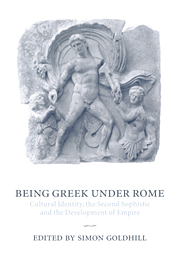Book contents
- Frontmatter
- Contents
- List of contributors
- Introduction: Setting an agenda: ‘Everything is Greece to the wise’
- 1 Subjected to Empire
- II Intellectuals on the margins
- III Topography and the performance of culture
- 7 ‘Greece is the World’: exile and identity in the Second Sophistic
- 8 Local heroes: athletics, festivals and elite self-fashioning in the Roman East
- 9 The Rabbi in Aphrodite's bath: Palestinian society and Jewish identity in the High Roman Empire
- List of works cited
- Index of major passages discussed
- General index
7 - ‘Greece is the World’: exile and identity in the Second Sophistic
Published online by Cambridge University Press: 22 January 2010
- Frontmatter
- Contents
- List of contributors
- Introduction: Setting an agenda: ‘Everything is Greece to the wise’
- 1 Subjected to Empire
- II Intellectuals on the margins
- III Topography and the performance of culture
- 7 ‘Greece is the World’: exile and identity in the Second Sophistic
- 8 Local heroes: athletics, festivals and elite self-fashioning in the Roman East
- 9 The Rabbi in Aphrodite's bath: Palestinian society and Jewish identity in the High Roman Empire
- List of works cited
- Index of major passages discussed
- General index
Summary
… you do not realise that everything is Greece to a wise man …
Philostratus, VA 1.35… if I narrate the course of my exile, men will say, not that I am lamenting, but far rather that I am boasting.
Dio Chrysostom, Oration 45.2The motif of exile has been used throughout history to express cultural problems and to explore identity politics: from Exodus to Exil et le royaume and beyond, the notion of expatriation has been exploited to interrogate relationships between human beings and society. Indeed, writers over the last century have pursued this theme with unprecedented vigour: in modernism and postmodernism, the alienation and solitude of the individual is frequently articulated through the topology of exile (one thinks of the literary significance of the expatriation of Joyce, Eliot, Pound, Yeats and Becket). Modernist exile, especially under the influence of Sartrian notions of alienation, is now, as Bruce Robbins wittily puts it, ‘at home in the academy’. Exile is also frequently cited as a metaphor for ‘the postmodern condition’: in an introduction to a recent collection entitled Literature and Exile, David Bevan claims that exile stands for all forms of estrangement: ‘exile, viscerally, is otherness’. Exile has become one of the fundamental tropes for recent writers on culture and identity.
This chapter will seek not to unify such diverse representations, to present a ‘phenomenology of exile’, but to demonstrate that in antiquity too, in the period we know as the ‘Second Sophistic’, there was considerable interest in exploring and expressing issues of cultural identity through the language of exile.
- Type
- Chapter
- Information
- Being Greek under RomeCultural Identity, the Second Sophistic and the Development of Empire, pp. 269 - 305Publisher: Cambridge University PressPrint publication year: 2001
- 34
- Cited by



